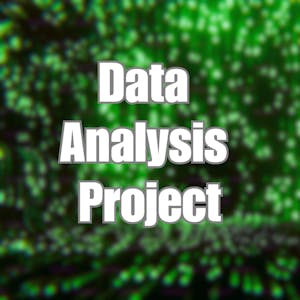Data Analysis with Python Project
About this Course
The \"Data Analysis Project\" course empowers students to apply their knowledge and skills gained in this specialization to conduct a real-life data analysis project of their interest. Participants will explore various directions in data analysis, including supervised and unsupervised learning, regression, clustering, dimension reduction, association rules, and outlier detection. Throughout the modules, students will learn essential data analysis techniques and methodologies and embark on a journey from raw data to knowledge and intelligence. By completing the course, students will be proficient in data analysis, capable of applying their expertise in diverse projects and making data-driven decisions. By the end of this course, students will be able to: 1. Understand the fundamental concepts and methodologies of data analysis in diverse directions, including supervised and unsupervised learning, regression, clustering, dimension reduction, association rules, and outlier detection. 2. Define the scope and direction of a data analysis project, identifying appropriate techniques and methodologies for achieving project objectives. 3. Apply various classification algorithms, such as Nearest Neighbors, Decision Trees, SVM, Naive Bayes, and Logistic Regression, for predictive modeling tasks. 4. Implement cross-validation and ensemble techniques to enhance the performance and generalizability of classification models. 5. Apply regression algorithms, including Simple Linear, Polynomial Linear, and Linear with regularization, to model and predict numerical outcomes. 6. Perform multivariate regression and apply cross-validation and ensemble methods in regression analysis. 7. Explore clustering techniques, including partitioning, hierarchical, density-based, and grid-based methods, to discover underlying patterns and structures in data. 8. Apply Principal Component Analysis (PCA) for dimension reduction to simplify high-dimensional data and aid in data visualization. 9. Utilize Apriori and FPGrowth algorithms to mine association rules and discover interesting item associations within transactional data. 10. Apply outlier detection methods, including Zscore, IQR, OneClassSVM, Isolation Forest, DBSCAN, and LOF, to identify anomalous data points and contextual outliers. Throughout the course, students will actively engage in tutorials, practical exercises, and the data analysis project case study, gaining hands-on experience in diverse data analysis techniques. By achieving the learning objectives, participants will be well-equipped to excel in data analysis projects and make data-driven decisions in real-world scenarios.Created by: University of Colorado Boulder

Related Online Courses
Fossil fuels have been the primary energy source for society since the Industrial Revolution. They provide the raw material for the manufacture of many everyday products that we take for granted,... more
Give me the follower and I\'ll give you the leader! Leadership depends on our deep-rooted perceptions of authority The concept of leadership probably rings a bell, but have you ever heard of... more
Welcome to the Monitoring, Streams, and Connectors course! The course is designed to equip participants with advanced skills and knowledge in the critical areas of monitoring, data streams, and... more
In this course, you\'ll learn to install VMware and create a virtual environment with both hacker and target labs. You\'ll master advanced information gathering and reconnaissance in both active... more
The UI Automation and Selectors course provides a deep understanding of the different methods used while interacting with the User Interface of different applications like Excel, Word, CRM,... more








